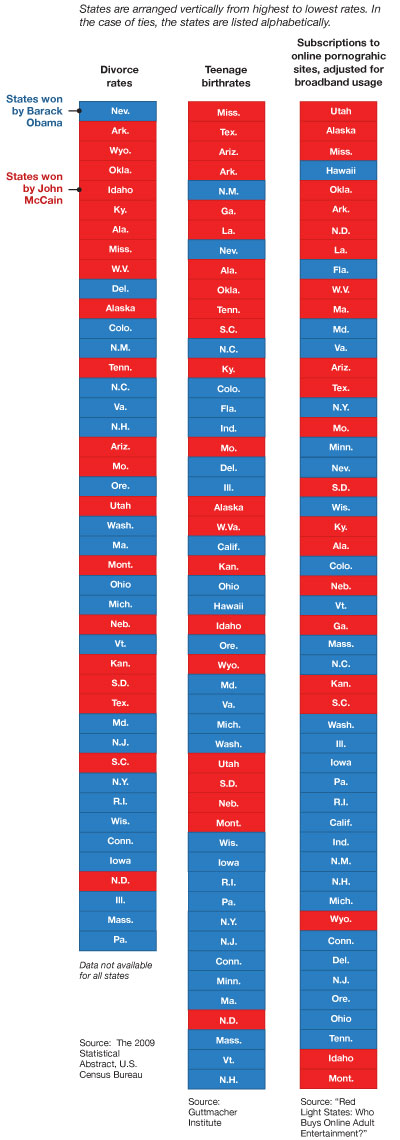Inverse correlation between norms and behaviour?
We know, of course, that people don't strictly abide by the norms they publicly express: the flesh is weak, and so on, but, from an anthropological point of view, it would be surprising to see a complete disconnect between norms and behaviour. Even more surprising would be to see a reverse correlation, that is to have people who insist, "don't do A!" (for instance, don't commit adultery) do A more often than other people who have no strong objection to A. This, however, is exactly what is happening with American conservatives, according to Charles M. Blow (a New York Times's columnist with a blog about all things statistical and their visual expressions) who published on June 27 an op-ed [1] (with a fascinating chart (reproduced below) to prove it.
Blow has reliable sources:
"According to the Census Bureau's Statistical Abstract, states that went Republican in November accounted for eight of the 10 states with the highest divorce rates in 2006.... According to 2006 data from the Guttmacher Institute, those red states accounted for eight of the 10 states with the highest teenage birthrates. And, a study titled "Red Light States: Who Buys Online Adult Entertainment?" published earlier this year in the Journal of Economic Perspectives found that subscriptions to online pornography sites were "more prevalent in states where surveys indicate conservative positions on religion, gender roles, and sexuality" and in states where "more people agree that ‘I have old-fashioned values about family and marriage.'"

This is not the place to gloat about or on the contrary deplore the political implications of these findings. As I said, I find them anthropologically puzzling. What is the causal link here between norms and behavior? Do norms favour violation-of-norms behaviour? If so, is it directly by some kind of contrarian attitude to norms, or to certain kind of norms, or is it that the norms-abiding behaviour of the majority elicits private or public rebellion in a strong minority? Does, with causality going in the reverse direction, a greater incidence - with its own etiology - of socially problematic behaviour (supposing it makes sense to describe it so) cause a majority people to express norms against such behavior? The answer is likely to be more complicated and interesting than any of these simple suggestions. A good puzzle for cultural epidemiology.
[1] Blow, C. M. (2009). The prurient trap. New York Times.




Karen Lofstrom 29 June 2009 (01:06)
I did dissertation research in Tonga, more than 20 years ago, and never finished writing up. But here's a snippet of what I found. If you listen to official speech, public speech, as in sermons and political speechifying, you will hear endless exhortations to be talangofua (obedient). Obedient to the man of the house, to the minister, the church, the town officer, the government, the king. If people are allowed to fa'iteliha (do what they want) then social life will collapse. One minister explained to me that if you let people disobey the Sabbath laws, then unbridled license would result. People would steal, commit adultery, kill. Only strict rules, strong hierarchy, and instant punishment keep people in line. But when you listen to people in unofficial, social situations, fa'iteliha is a GOOD thing. It is the summum bonum. No work, no rules, just kick back, relax, have a good time, do what you please. The same people who hate fa'iteliha officially, will unofficially approve of it. I never heard anyone comment on this weird disjunction. It was apparent to me, but not to the people who were living in this tension between obedience and anarchy. I have the impression that the middle and upper classes of Victorian England lived in something of the same bind re sex. Sex bad/sex ultimately desirable. Seems as if the Southern US states are still living in that tension, whereas ... Many of the rest of us are living out the tension between food must be controlled/food overwhelmingly seductive. Women's magazines with articles on the latest fad diets AND recipes for lucious deserts. You could perhaps generalize as "the more you stress the need to control something, the more that something is enticing" -- but I don't know how you would get from individual psychological assertions to social conditions. Or, how you would explain why groups of people fixate on one control issue rather than another.
Tom Rees 5 July 2009 (15:43)
Interesting new study that might help explain the conundrum: [url]=http://www.sciencedaily.com/releases/2009/06/090626141233.htmWhy Saints Sin And Sinners Get Saintly[/url] \"The study suggests that people with ample moral self-worth in one aspect of their lives can slip into immorality or opposite behavior in other areas -- their abundant self-esteem somehow pushing them to balance out all that goodness.\"
José-Luis Guijarro 6 July 2009 (21:41)
Being no Anthropologist myself, I had always thought that this feature was always the case: the more one legislates against something, the more one boasts about morality, the more you indulge into the sins that you (say) you abhor. We even have a popular saying that says: [i]dime de qué presumes y te diré de qué caraces[/i] (tell me what you boast of and I will tell you what you lack). It comes as a surprise to me that this should be considered curious ...
Hugo Mercier 8 July 2009 (19:46)
Here's an interesting piece in Slate on a related issue: The nature of temptation Why those who speak against vice so often fall for it http://www.boston.com/bostonglobe/ideas/articles/2009/07/05/the_nature_of_temptation/
jeremy mousset 21 August 2009 (01:39)
Half seriously, maybe one can go back to the good old [i]Tao Te Ching[/i] : "The more laws are promulgated, The more thieves and bandits there will be."
Ilkka Pyysiäinen 24 August 2009 (21:28)
So, if murder were not criminalized, there would be no murderers. People would just kill each other. Big difference?
jeremy mousset 25 August 2009 (19:24)
Trying to apply the principle of charity as a methodological principle (or as one more norm ?) I thought one may have other interpretations. It is doubtful that the people who wrote the Tao Te Ching were advocating the decriminalization of murder. It is not a necessary implication of the sentence either. The sentence can take another meaning when one thinks about the unanticipated consequences of "prohibition" for example.